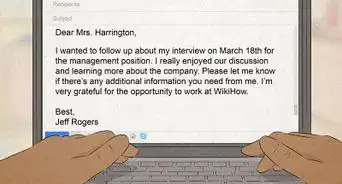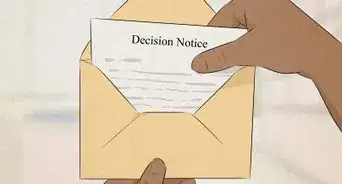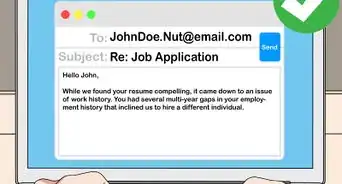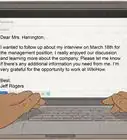This article was co-authored by Amber Rosenberg, PCC. Amber Rosenberg is a Professional Life Coach, Career Coach, and Executive Coach based in the San Francisco Bay Area. As the owner of Pacific Life Coach, she has 20+ years of coaching experience and a background in corporations, tech companies, and nonprofits. Amber trained with the Coaches Training Institute and is a member of the International Coaching Federation (ICF).
There are 15 references cited in this article, which can be found at the bottom of the page.
This article has been viewed 156,886 times.
To land the job of your dreams, sometimes you simply have to be willing to ask for it. Whether you’re looking to jumpstart your career or just pick up some extra hours over summer vacation, it’s important to present yourself in a way that leaves a lasting impression on your prospective employer. You should make an effort to look your best, express yourself effectively and display a positive, never-say-die attitude that will recommend you as a natural choice for the job.
Steps
Securing the Job you Want
-
1Find the best possible contact. Do a little research to find out who’s in charge of making hiring decisions for the company you wish to work for. For small private businesses this may be the owner themselves, or it may be a human resources officer or staffing director at a big corporation. Going through the appropriate channels is the first step toward gaining an audience.[1]
- With most retail and service jobs, you can simply walk in and request to speak to a manager.
- If you have a friend or acquaintance that works for the company, see if they could give you some advice or help set up a meeting between you and one of the higher ups.
-
2Take the direct approach. Once you get a chance to speak to someone with some influence, let them know up front that you’re interested in working for them. Show them that you’re eager, enthusiastic and ready to work hard. Chances are, they’ll be impressed by your initiative.[2]
- The key is to be assertive, but not too forceful. Never make demands of an employer or come in with a sense of entitlement.
- Open with a statement like "I think I would be a very good fit for your company" or "I believe my ideas and ambition could be of real service to your operations."[3]
Advertisement -
3Send an email. Be sure to attach your resume, an original cover letter explaining why you're interested in the job and a link to the open position, if it was posted online. These days, most established companies screen potential employees electronically, so this will be your first opportunity to make contact with the people you could be working for in the future. Emailing an employer directly is much more personable than mass-posting your resume to various job search websites.[4]
- Be explicit about the purpose of the email with a subject line like "Senior Editor Position."
- Always be cordial, professional and prompt in your email correspondence. Hiring supervisors pay close attention to the way prospective employees communicate.[5]
-
4Schedule a time for a sit down. In some instances, the person offering a job might be a family friend, acquaintance or former business associate. If this is the case, it will usually be okay to meet with them casually to discuss the details of the job. Find a time that fits the employer's schedule and be prepared to tell them a little about yourself and what you're looking for.
- Set up a meeting by calling or speaking to the employer in person ahead of time.
- Even if it's not a formal interview, you should plan on showing up early and looking respectable.[6]
- Don't assume that you'll be guaranteed a job just because you know someone. You should treat the sit down with the same respect and consideration you would any other professional situation.
Making Yourself Attractive to the Employer
-
1List your qualifications. Describe yourself and your experience in the field. Include an overview of your recent job history, as well as any relevant education and volunteering opportunities. Don’t assume that the person in charge of hiring will recognize the value of your skills immediately—make them see how they will prove useful.[7]
- Don’t just recite what’s on your resume. Explain to the employer how those qualifications can be applied and adapted: "as you can see, my four years as a teacher have provided valuable experience in working closely with groups of all different ages."
- If you don’t have any experience to speak of, focus on the aspects of your personality that you think would make you a good fit for the position.
-
2Demonstrate your usefulness. Don’t wait until you’ve been hired to start being an asset for the company. Be proactive and tell your contact or interviewer exactly what sort of things you would bring to the table. Doing this shows resourcefulness and makes it clear that you’ve put serious thought into filling the position you’re seeking.[8]
- Entice the employer with an idea on how to boost productivity, a writing sample or an example of a program you helped develop.
- This is often as simple as mentioning past accomplishments like "at my last job I helped overhaul the new employee training program," or hinting at future ones like "I look forward to seeing how working in a more organized kitchen will help me improve my skills as a cook."
- Providing a preview of the kind of work you do can help you showcase your practical abilities, allowing the company to feel confident in their decision to hire you.
-
3Show an interest in the business. Read up on the company’s history, goals and product or service to familiarize yourself with what they’re all about. Then, tailor your pitch to highlight the qualities of yours that are consistent with their business model. Many employers will be more willing to give you a chance if they think you have the best interest of the company at heart.
- Make it evident to the person you’re meeting with that you want a job with their company, not just any company.
- Avoid saying things like “I need a job” or “I heard you were hiring.” You’ll make a much better impression if you appear to be actively pursuing the job you’re asking for.[9]
-
4Establish a mutual connection. Point out the things that you have in common with your contact, such as a close friend or associate. If somebody you know referred you to the job, be sure to mention them by name as someone that can vouch for your character. Networking is an important part of the job search because it suggests that you can be trusted.[10]
- Bring up your relationship with your connection in a way that sounds organic. For instance, you could say “my friend Christina told me that she loved working with you” or “my uncle has always been a satisfied client of yours.”
- Don’t rely on name dropping to get you hired. You should be able to secure the job on your own merits—having a friend or two in common just helps.[11]
-
5Use plural language. Instead of referring to yourself in the first person, use words like “us,” “we” and “our.” When you talk like you’re already a part of the team, the person you’re speaking to will begin to see you that way. This may make them more likely to seal the deal and bring you onboard.[12]
- Listen for the other person to start using plural language as well. This is a good sign that you’re winning them over.
-
6Find out how you can follow up. If you’re uncomfortable with the thought of boldly asking for the job, you can try moving things along in another way. Before you leave or hang up the phone, see if you can get more information about the next phase of the hiring process. Ask questions like "when would be a good time for me to call you back and go over some of this information in more detail?"[13]
- Request feedback to get an idea of how you did, or what you could do differently next time.[14]
- For most employers, the fact that you’re already looking forward to what you can do next will be taken as a promising sign.
Presenting Yourself Professionally
-
1Put some effort into your appearance. Before you show up for an interview or a friendly sit down, take some time to pick out a set of attire that fits you well and is appropriate for the occasion. You want to look sharp, but don’t be too casual or make a spectacle of yourself. Remember to comb your hair, brush your teeth and make sure that your clothing is free of dust and wrinkles. [15]
- In addition to the obvious, be sure to wear deodorant, clean beneath your fingernails and keep facial hair shaved or trimmed.
- As the old saying goes, “dress for the job you want.” If you look the part, potential employers will be better able to envision you in the position.
-
2Communicate clearly and effectively. Aim for a tone that’s relaxed and friendly yet professional. When you’re not talking, listen attentively without interrupting. The person you’re speaking to should be just as comfortable with you as you are with them. Give detailed answers to the questions you’re asked, but resist the urge to boast or talk about yourself at length.[16]
- Do your best not to stutter, mumble or use a lot of filler noises like “um” and “ah.”
- If you’re asking for a job via email, take care to use proper spelling, punctuation and grammar. Proofread the message carefully before you send it.[17]
-
3Be tenacious. Just because you don’t get a job offer right away doesn’t mean that you never will. It may be that the specific position hasn’t opened up yet, or that whoever’s in charge needs more time to interview other applicants. Follow up with a phone call or email within a few days to let someone know that you’re still interested and hopeful to hear back.[18]
- Confidence speaks volumes. Sometimes, what you lack in direct experience you can make up for in being self-assured.
- While determination is a good trait to have, you should learn to take no for an answer.
- Don’t be too discouraged if you don't get the job—thank the person for their time, then redouble your efforts and make sure you’re prepared for the next opportunity that comes along.[19]
Expert Q&A
-
QuestionHow do you ask for a job in a message?
 Amber Rosenberg, PCCAmber Rosenberg is a Professional Life Coach, Career Coach, and Executive Coach based in the San Francisco Bay Area. As the owner of Pacific Life Coach, she has 20+ years of coaching experience and a background in corporations, tech companies, and nonprofits. Amber trained with the Coaches Training Institute and is a member of the International Coaching Federation (ICF).
Amber Rosenberg, PCCAmber Rosenberg is a Professional Life Coach, Career Coach, and Executive Coach based in the San Francisco Bay Area. As the owner of Pacific Life Coach, she has 20+ years of coaching experience and a background in corporations, tech companies, and nonprofits. Amber trained with the Coaches Training Institute and is a member of the International Coaching Federation (ICF).
Pacific Life Coach If you’re looking for a professional job, make a spreadsheet of companies where you wish to work. Once you’ve identified contacts at your desired companies, add their contact info to your spreadsheet. Email them, reminding them how you know each other and explaining that you’re interested or intrigued by what they’re doing professionally. Then, follow-up and set-up informational interviews.
If you’re looking for a professional job, make a spreadsheet of companies where you wish to work. Once you’ve identified contacts at your desired companies, add their contact info to your spreadsheet. Email them, reminding them how you know each other and explaining that you’re interested or intrigued by what they’re doing professionally. Then, follow-up and set-up informational interviews. -
QuestionHow do you say I'm looking for a job?
 Amber Rosenberg, PCCAmber Rosenberg is a Professional Life Coach, Career Coach, and Executive Coach based in the San Francisco Bay Area. As the owner of Pacific Life Coach, she has 20+ years of coaching experience and a background in corporations, tech companies, and nonprofits. Amber trained with the Coaches Training Institute and is a member of the International Coaching Federation (ICF).
Amber Rosenberg, PCCAmber Rosenberg is a Professional Life Coach, Career Coach, and Executive Coach based in the San Francisco Bay Area. As the owner of Pacific Life Coach, she has 20+ years of coaching experience and a background in corporations, tech companies, and nonprofits. Amber trained with the Coaches Training Institute and is a member of the International Coaching Federation (ICF).
Pacific Life Coach Send a message to the person in question — be it an old colleague, neighbor or friend —, explaining that you're transitioning from your job and asking to take them to coffee to talk about the industry or their company. Most people love to talk about their jobs and are happy to take 20 minutes to speak with you. This is a great way to find out about the 80% of jobs that are never advertised (there’s a lot less competition for these jobs, as well).
Send a message to the person in question — be it an old colleague, neighbor or friend —, explaining that you're transitioning from your job and asking to take them to coffee to talk about the industry or their company. Most people love to talk about their jobs and are happy to take 20 minutes to speak with you. This is a great way to find out about the 80% of jobs that are never advertised (there’s a lot less competition for these jobs, as well).
Warnings
- Avoid begging or groveling if you’re not offered the job right away. This may annoy the employer and make you come across as needy.⧼thumbs_response⧽
- Don’t contact someone about professional matters through their personal phone number, email or social media accounts unless they’ve told you it’s alright to do so.⧼thumbs_response⧽
References
- ↑ https://www.themuse.com/advice/how-to-ask-for-jobwithout-asking-for-a-job
- ↑ http://www.jobskills.info/interviews/ask-for-the-job.htm
- ↑ http://money.usnews.com/money/blogs/outside-voices-careers/2010/04/07/10-ways-to-ask-for-the-job-at-the-interview
- ↑ https://www.linkedin.com/pulse/20141110161814-6879710-how-to-effectively-inquire-about-a-job-opportunity/
- ↑ http://www.businessinsider.com/email-etiquette-rules-every-professional-needs-to-know-2016-1
- ↑ http://blog.gojobhero.com/how-to-handle-an-informal-job-interview/
- ↑ http://money.usnews.com/money/blogs/outside-voices-careers/2010/04/07/10-ways-to-ask-for-the-job-at-the-interview
- ↑ https://www.forbes.com/sites/dailymuse/2017/03/21/3-subtle-ways-to-ask-for-a-job-that-are-better-than-please-hire-me
- ↑ http://www.bbc.com/news/business-25024068
- ↑ https://www.glassdoor.com/blog/guide/how-to-get-a-job/
- ↑ https://www.theladders.com/p/8315/name-dropping-during-an-interview
- ↑ http://www.jobskills.info/interviews/ask-for-the-job.htm
- ↑ http://money.usnews.com/money/blogs/outside-voices-careers/2010/04/07/10-ways-to-ask-for-the-job-at-the-interview
- ↑ https://www.themuse.com/advice/how-to-ask-for-jobwithout-asking-for-a-job
- ↑ https://www.business.com/articles/dress-for-the-job-you-want/
- ↑ https://www.monster.com/career-advice/article/boost-your-interview-iq
- ↑ https://www.entrepreneur.com/article/278526
- ↑ https://www.livecareer.com/quintessential/job-interview-follow-up
- ↑ http://www.careerfaqs.com.au/careers/job-hunting-tips/coping-with-rejection-while-job-hunting
About This Article
Asking someone for a job can be intimidating, but asking in a professional and assertive way can impress prospective employers. When you meet someone you’re interested in working for, talk to them in person if you can and let them know that you’re eager and ready to work with them. You might say something like, “I heard that you have some openings, and I think I’d be a great fit for your company.” If you see a job posting online, reach out by email about your interest. Include a cover letter and resume, and make sure to clearly state in the subject line what position you’re interested in. If they’re willing to schedule an interview or even a casual chat about the job, take the opportunity to highlight your relevant skills and strengths, as well as your enthusiasm for the job. For example, you might say, “I loved working as a public education coordinator for my local museum, and I’m excited to apply what I learned in a larger institution!” For more tips from our Career Coach co-author, like how to present yourself professionally, read on!
























-Step-20-Version-2.webp)















































